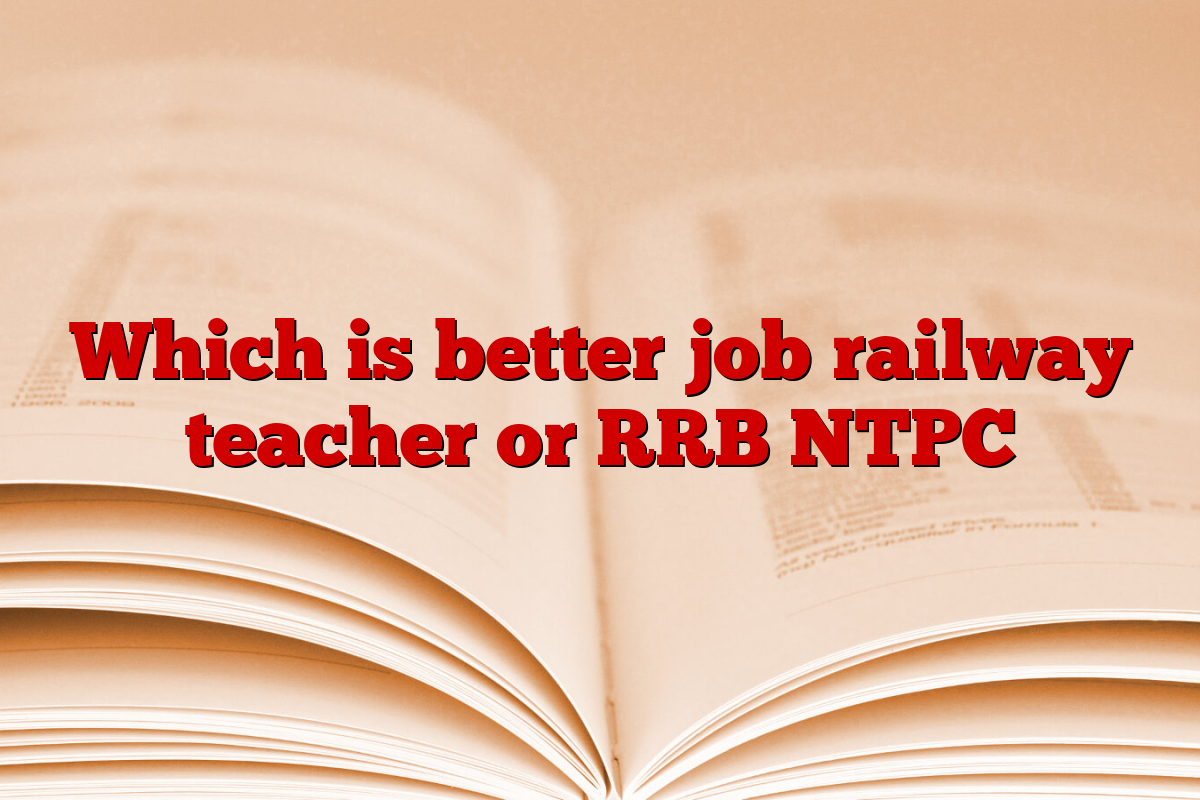Railway Recruitment Board is currently releasing large -scale vacancies in various departments. One of those large-scale recruitments has recently been released under Railway Teacher Recruitment and RRB non-technical categories (NTPC). Both Indian Railways provide a golden opportunity to get a safe and prosperous job. Is the aspirations looking for jobs in railway schools or in railway non-technical departments, in addition to their merit, there is a big opportunity to clarify. However, it is natural to be overwhelmed by the diversity of these jobs, which makes the candidates think “Who is a better job railway teacher or RRB NTPC?”.
But not mentioned, we are here to compare those differences that you should consider while deciding your fate. Thus, proceeding with this article will clean the fog from your glasses, which will give you a clear vision and reason to choose what you are doing or what has been made for you.
Eligibility Difference of Railway Teacher and RRB NTPC
For the actual comparison, we need to start with the eligibility criteria difference, which will clarify the primary aspect of the candidate’s selection. The eligibility criteria for Railway Teacher and RRB NTPC vary greatly on the basis of qualifications and requirements according to the job profile.
Whereas railway teacher posts require mainly 10+2 or graduate degrees for RRB NTPC posts, with teaching degrees such as deals, beds, or meds, CTET qualification, which without any teaching credentials The work is not necessary for the profile. In addition, the age limit for railway teachers extends up to 40 years, while the RRB NTPC post usually has a 33 -year upper limit on a level basis.
| Criterion | Railway Teacher (PRT, TGT, PGT) | RRB NTPC (Graduate and Graduate) |
| Educational qualification |
|
|
| Age limit | 18-40 years | 18-30 years (graduation), 18-33 years (graduate) |
| additional requirement | CTET Qualification (for PRT and TGT) | Typing skills (for some positions) |
| Experience | Not mandatory, but liked | Not necessary |
Railway teachers’ salary vs RRB NTPC
Although the Railway Recruitment Board ensures that all employees get good compensation according to their job profiles and efforts, but there is a difference between their salary structure as there is more skills and qualifications than teaching positions. The salary structure for railway teachers and RRB NTPC varies depending on the pay level, qualification and responsibilities. While railway teachers enjoy a higher early salary with structured salary increase under level -6 to level -8, RRB NTPC ranges from salary level -2 to level -6, where graduate level posts provide competitive salary Are, but additional skills such as typing proficiency may be required.
| Social class | Post | Pay level | Basic pay | Gross salary (approx) |
| Railway teacher | Primary teacher (PRT) | Level -6 | Rupee. 35,400/- | Rupee. 50,000 – Rs. 55,000/- |
| Trained graduate teacher (tGT) | Level -7 | Rupee. 44,900/- | Rs.60,000- Rs.65,000/- | |
| Postgraduate teacher | Tier | Rupee. 47,600/- | Rupee. 65,000 – Rs. 75,000/- | |
| RRB NTPC (Graduate) | Level -2 posts (eg, Junior Clerk cum Typist, Account Clerk cum Typist) | level 2 | Rupee. 19,900/- | Rupee. 30,000 – Rs. 35,000/- |
| Level -3 posts (eg, commercial cum ticket clerk, train clerk) | level 3 | Rupee. 21,700/- | Rupee. 32,000 – Rs. 38,000/- | |
| RRB NTPC (Graduate) | Level -5 posts (eg, senior clerk cum typist, senior commercial cum ticket clerk) | Level -5 | Rupee. 29,200/- | Rupee. 45,000 – Rs. 50,000/- |
| Level -6 posts (eg, station master, commercial trainee) | Level -6 | Rupee. 35,400/- | Rupee. 55,000 – Rs. 60,000/- |
How is the railway teacher job profile different from RRB NTPC?
As the name suggests, the railway teacher’s job focuses on academic responsibilities, while RRB NTPC roles include administrative and operational functions. The role of a teacher is fixed within railway schools, while NTPC employees can work in many departments that handle clerk, technical or managerial duties.
- Work nature: Railway teachers handle teaching and student development, while NTPC employees work in office administration, accounts and customer service.
- Work atmosphere: Teachers work within schools, while NTPC employees may be in stations, offices or region roles.
- Development opportunities: Teachers follow seniority-based promotion, while NTPC employees have internal departmental examination for the development of career.
- work hours: Teachers have school time fixed, while NTPC employees may have rotational changes.
- Job security: Both provide job safety, but career progress in teaching roles is structured, while NTPC jobs provide diverse departmental publicity.
Which is better job railway teacher or RRB NTPC?
As mentioned above, both recruitment and job profiles differ in more ways than each other as we can think. Released by the same organization “RRB”, both recruit to each situation asks for a different talent, one, educational status and the other non-technical one. With these major differences, candidates can easily understand what the job profile will suit their merit and ambitions.
If teaching, educational development, and structured work-life balance appeal to an aspiration, a railway teacher is ideal. On the other hand, if one prefers dynamic roles, administrative functions and the dynamics of the career, the RRB NTPC offers a variety of opportunities. Eventually, both roles provide a safe career under Indian Railways, leading to the best option for individual aspirations.
sharing is Caring!
